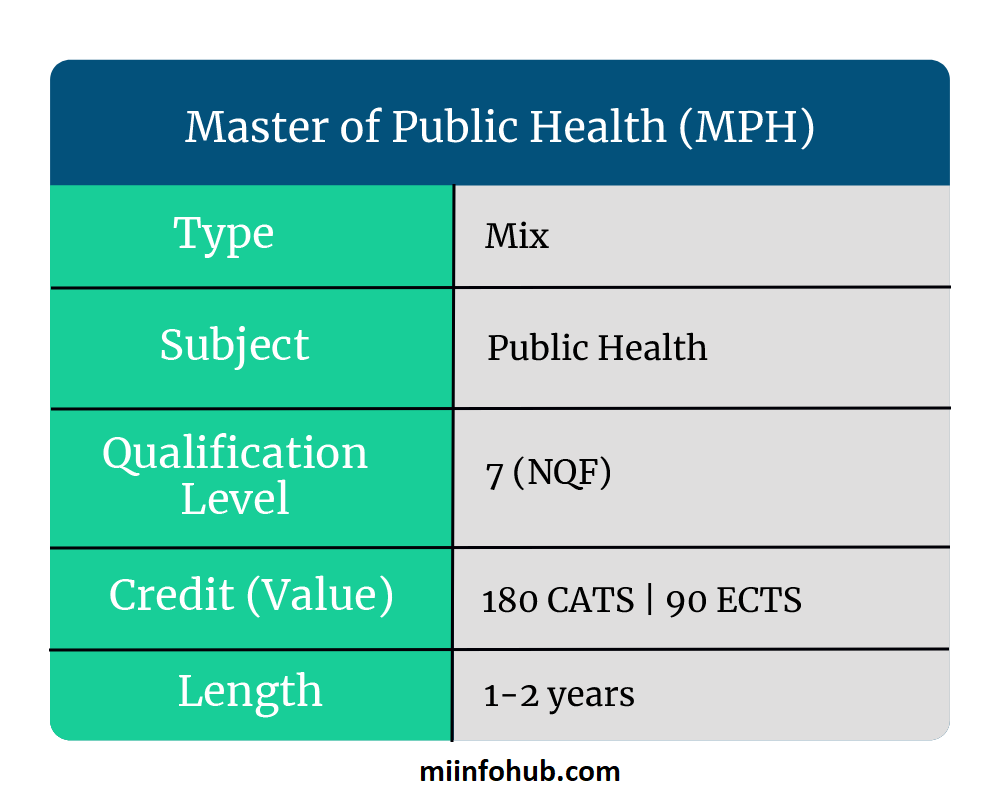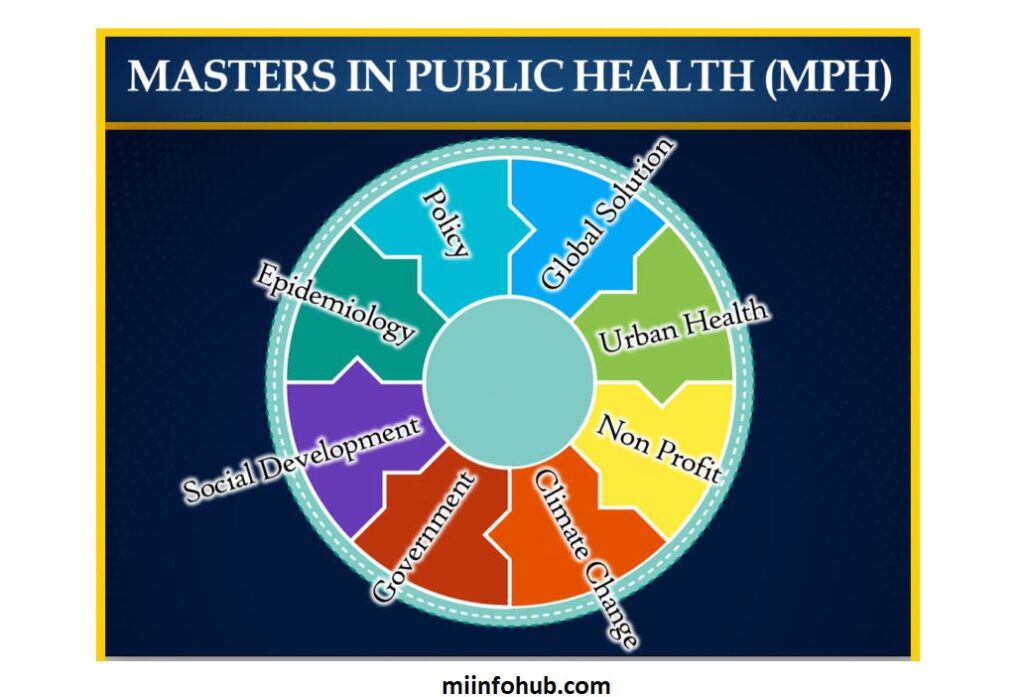A Masters in Public Health (MPH) opens a variety of doors for career advancement and personal growth. This degree prepares you to address health issues on a community, national, and global level. Here’s a comprehensive guide on what to do with an MPH, including career paths, further education, essential skills, salary expectations, and more. If you want to know more about What Can I Do With A Masters In Public Health then click here.

Understanding Public Health
Public health focuses on improving the health of populations. It encompasses various fields, including:
- Epidemiology: The study of disease patterns and health outcomes.
- Biostatistics: The application of statistics to analyze public health data.
- Environmental Health: Examining how environmental factors affect health.
- Health Policy and Management: Creating and implementing health policies.
- Global Health: Addressing health issues that transcend national borders.
Career Opportunities For Masters In Public Health
With an MPH, you can pursue a wide range of careers. Here are some of the most popular options:
Epidemiologist
Epidemiologists study patterns of diseases in populations. They collect and analyze data to identify health trends. Employment settings include:
- Government health departments
- Research institutions
- Nonprofits and NGOs
Public Health Educator
Public health educators create programs to teach communities about health. They focus on prevention and healthy living. They often work in:
- Schools
- Community organizations
- Health departments
Health Policy Analyst
Health policy analysts evaluate and develop policies affecting public health. They conduct research and provide recommendations to policymakers. Typical employers include:
- Government agencies
- Think tanks
- Advocacy organizations
Biostatistician
Biostatisticians apply statistical methods to biological and health-related research. They play a crucial role in designing studies and interpreting data. They work in:
- Research institutions
- Pharmaceutical companies
- Government agencies
Environmental Health Specialist
Environmental health specialists assess health risks from environmental factors. They work on issues like air and water quality. Employment opportunities are found in:
- Environmental protection agencies
- Consulting firms
- Nonprofits
Global Health Professional
Global health professionals work to improve health systems in low-income countries. They often collaborate with international organizations. Roles can include:
- Program manager
- Research analyst
- Field officer
Health Services Manager
Health services managers oversee health care facilities or programs. They ensure efficient operation and compliance with regulations. They work in:
- Hospitals
- Clinics
- Health departments
Community Health Worker
Community health workers serve as a bridge between the community and health services. They educate and support individuals to improve health outcomes. They typically work in:
- Community organizations
- Health clinics
- Nonprofits

Job Market Trends For Masters In Public Health
The job market for public health professionals is growing. Key trends include:
- Increased Demand for Epidemiologists Due to Infectious Disease Outbreaks: The growing need for epidemiologists to analyze and respond to disease outbreaks, leading to heightened recruitment and job opportunities in the field.
- A Rising Focus on Health Equity and Social Determinants of Health: An increased emphasis on addressing disparities in health outcomes influenced by social, economic, and environmental factors, prompting public health initiatives aimed at promoting equity.
- Growing Opportunities in Global Health Initiatives: Expanding career prospects for public health professionals in international health projects and collaborations that aim to improve health outcomes in various countries and communities worldwide.
MPH Career Pathways: Key Roles, Responsibilities, And Salary Insights
Here’s a comparison table highlighting various career options for individuals with a Master’s in Public Health (MPH). This table provides insights into roles, key responsibilities, salary ranges, and required skills to help you understand the differences and similarities among these career paths.
| Career Path | Key Responsibilities | Salary Range | Required Skills | Job Outlook |
|---|---|---|---|---|
| Epidemiologist | Study disease patterns; analyze health data; conduct research. | $60,000 – $100,000 | Analytical skills, research skills, critical thinking. | Growing demand due to disease outbreaks. |
| Public Health Educator | Develop and implement health education programs; promote healthy behaviors. | $50,000 – $80,000 | Communication skills, presentation skills, community engagement. | Steady growth as health education becomes crucial. |
| Health Policy Analyst | Analyze health policies; provide recommendations; conduct research. | $65,000 – $120,000 | Research skills, policy analysis, strong communication. | Increasing focus on health policy reform. |
| Biostatistician | Apply statistical methods to health-related data; design studies. | $70,000 – $130,000 | Statistical analysis, data interpretation, programming skills. | High demand in research and healthcare industries. |
| Environmental Health Specialist | Assess health risks from environmental factors; promote safety regulations. | $55,000 – $95,000 | Analytical skills, understanding of environmental science, problem-solving. | Growing concern for environmental health issues. |
| Global Health Professional | Work on health initiatives worldwide; collaborate with organizations. | $50,000 – $110,000 | Cultural competence, project management, adaptability. | Increasing opportunities in global health. |
| Health Services Manager | Oversee healthcare facilities; ensure compliance and efficiency. | $80,000 – $150,000 | Leadership skills, management skills, financial acumen. | Strong growth due to an aging population. |
| Community Health Worker | Serve as a liaison between communities and health services; provide support and education. | $35,000 – $65,000 | Interpersonal skills, knowledge of community resources, empathy. | Steady demand in underserved areas. |

Further Specialization For Masters In Public Health
Consider specializing within public health. Specializations can enhance your skills and job prospects. Options include:
- Maternal and Child Health: Focus on health issues affecting mothers and children.
- Nutrition: Address dietary needs and promote healthy eating habits.
- Infectious Diseases: Study and manage outbreaks of diseases.
- Health Informatics: Use technology to improve health care delivery.
Networking And Professional Development
Networking is crucial in public health. Join organizations such as:
- American Public Health Association (APHA): A professional organization that advocates for public health policies, provides resources for public health professionals, and promotes the health of the public through research, education, and community engagement.
- Society for Public Health Education (SOPHE): A nonprofit organization dedicated to advancing the profession of health education and promotion, providing resources, professional development, and advocacy for health educators.
- National Association of County and City Health Officials (NACCHO): A national organization representing local health departments, focusing on improving public health practices, providing resources and training, and advocating for policies that support community health.
Internships And Volunteer Work
Gain practical experience through internships or volunteer work. Many organizations offer positions for MPH students. This experience builds your resume and enhances your skills. Look for opportunities in:
- Local Health Departments: Government agencies at the community level responsible for implementing public health programs, monitoring health trends, and ensuring access to healthcare services within their jurisdiction.
- Nonprofit Organizations: Independent organizations that operate for a charitable purpose, often focused on specific health issues, community outreach, and advocacy to improve public health outcomes.
- Research Institutions: Academic or specialized organizations dedicated to conducting scientific studies and research in various areas of public health, often contributing to the development of new knowledge and evidence-based practices.

Consider Further Education For Masters In Public Health
Some MPH graduates choose to pursue additional education. Options include:
- Doctorate in Public Health (DrPH): Focuses on advanced public health practice.
- Ph.D. in Public Health: Emphasizes research and academic careers.
Explore Research Opportunities
Engaging in research is vital for advancing public health knowledge. Many MPH programs encourage student involvement in research projects. Consider:
- Partnering with Faculty on Research Studies: Collaborating with academic professors or researchers to contribute to ongoing studies in public health, leveraging their expertise and resources.
- Conducting Your Own Research Project: Initiating and carrying out an independent study to investigate a specific public health question, which includes designing the study, collecting data, and analyzing results.
- Publishing Your Findings in Academic Journals: Submitting research results to scholarly publications for peer review and dissemination, allowing the wider public health community to benefit from your insights and discoveries.
Stay Informed And Adaptable
Public health is constantly evolving. Stay informed about new research, policies, and trends. Engage in continuous learning by:
- Attending Workshops and Webinars: Participating in organized sessions or online events focused on specific public health topics to gain new knowledge, skills, and networking opportunities.
- Subscribing to Public Health Journals: Obtaining regular issues of academic or professional publications that provide the latest research, trends, and insights in the field of public health.
- Participating in Online Courses: Engaging in structured educational programs available on the internet that cover various public health subjects, allowing for flexible learning and skill development.
Essential Skills To Develop
Certain skills are crucial for success in public health. Focus on developing:
- Analytical Skills: Ability to analyze data and interpret findings.
- Communication Skills: Effectively convey information to diverse audiences.
- Problem-Solving Skills: Address complex health issues with innovative solutions.
- Leadership Skills: Inspire and guide teams toward health goals.
Consider Certification
While not always required, obtaining certification can enhance your credentials. The Certified in Public Health (CPH) credential demonstrates your knowledge and commitment. Consider pursuing certification from organizations like:
National Board of Public Health Examiners (NBPHE)
- The National Board of Public Health Examiners (NBPHE) is an organization that provides certification for public health professionals through the Certified in Public Health (CPH) credential, promoting standards of excellence and ensuring that individuals possess essential public health knowledge and skills.

Impact Of Public Health Work
Public health professionals play a crucial role in improving community health. Successful initiatives can lead to:
- Lower Disease Rates: A reduction in the incidence and prevalence of diseases within a population, often achieved through effective public health interventions, prevention strategies, and health policies.
- Improved Health Education: Enhanced understanding and awareness of health issues among the public, resulting from educational programs and outreach efforts that promote healthy behaviors and disease prevention.
- Increased Access to Health Services: Greater availability and utilization of healthcare resources, ensuring that more individuals can receive necessary medical care, preventive services, and health support, particularly in underserved communities.
Work-Life Balance
Work-life balance varies by role in public health. Consider factors such as:
- Job Demands: The responsibilities and challenges associated with a specific role, including workload, pressure to meet deadlines, and the complexity of tasks required.
- Work Environment: The physical and social setting where work takes place, which can range from office spaces and laboratories to community sites and field locations.
- Flexibility of Hours: The degree to which work hours can vary, allowing for adjustable schedules that accommodate personal needs or project demands, such as the ability to work outside of standard office hours.
Global Opportunities For Masters In Public Health
Working internationally in public health is a possibility. Many organizations focus on global health issues. Opportunities include:
- International NGOs: Work on health initiatives worldwide.
- Government Agencies: Participate in global health diplomacy.
- Research Organizations: Study global health trends.
Conclusion
A Master’s in Public Health provides diverse career opportunities and the ability to make a significant impact on community health. Whether you pursue a career as an epidemiologist, health educator, or policy analyst, the possibilities are vast. Specializing, networking, and gaining experience are key to success. Embrace your passion for public health, and you can drive meaningful change in communities and beyond. Your journey in public health begins now!


